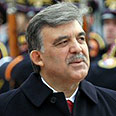
Turkey, Russia see Hamas role in peace process
In joint press conference with Dmitry Medvedev, Turkish President Abdullah Gul says Islamist movement cannot be excluded from talks, urges Palestinian unity. Foreign Ministry rejects negotiations with Hamas, says Jerusalem 'deeply disappointed by Russian president's meeting with Khaled Mashaal in Damascus'
Turkey and Russia said on Wednesday the Palestinian Islamist movement Hamas should not be excluded from the Middle East peace process after this week's launch of indirect talks between the Palestinians and Israel.
Hamas, which is backed by Syria and Iran, has been shunned by the West for refusing to recognize Israel, renounce violence and accept existing interim Israeli-Palestinian peace deals.
At a joint news conference with Russian President Dmitry Medvedev in the Turkish capital Ankara, President Abdullah Gul said peace could not be achieved if Hamas was not involved.
"Nobody should be excluded when these talks are held. Unfortunately the Palestinians are divided in two. They must be united and to unite them there must be talks with both sides. The Hamas side won elections in Gaza and so cannot be ignored," Gul said.
Hamas' takeover in Gaza left the Palestinians' mainstream Fatah movement in control only in the West Bank. Fatah is the dominant party in the Palestine Liberation Organization (PLO), which entered into the 1990s interim peace accords.
Gul added: "When Turkey talked (with Hamas) it faced threats but it emerged that Turkey was right. You cannot achieve peace by excluding people."
The Foreign Ministry said Wednesday evening that it "strongly rejects the call made by the Russian and Turkish president to let Hamas participate in the peace process."
The ministry said in a statement that Jerusalem was "deeply disappointed by the Russian president's meeting with Khaled Mashaal in Damascus."
The Foreign Ministry added that "Hamas is a terror organization for all intents and purposes, which has declared that its goal is to destroy the State of Israel. Hamas men are responsible for the murder of hundreds of innocent civilians, including former Soviet Union residents and Russian citizens.
"Enlightened states must not divide terrorists to good and bad according to a geographical division. Terrorists are terrorists, and Israel sees no difference between Hamas terror directed at Israel and Chechen terror directed at Russia. There is no difference between Khaled Mashaal and Shamil Basayev.
"Israel has always stood by Russia in its war against Chechen terror. We would expect the same treatment when it comes to Hamas terror against Israel," said the office of Foreign Minister Avigdor Lieberman, who is currently visiting Japan.
Turkey as go-between
Turkey, a Muslim but secular state, has traditionally been an intermediary between Israel and the Arab world and has cooperated closely with the Jewish state on military matters.
Relations between them have cooled amid a series of spats triggered by Israel's offensive in Palestinian-ruled Gaza at the end of 2008, which prompted repeated fierce criticism from Turkish Prime Minister Tayyip Erdogan.
Medvedev and Syrian counterpart Bashar Assad met Khaled Meshaal, the exiled leader of Hamas, in Damascus on Tuesday.
After his talks with Gul on Wednesday, the Russian leader also indicated that Hamas should be included in the process.
"We agreed to perhaps resolve this problem more actively, attracting all sides that are participating in the conflict, without isolating anyone from the process," Medvedev said.
"What is happening now in the Palestinian administration shows that when there is such a division it's impossible to resolve internal problems - that's why the situation in Palestine itself is getting worse," he said.
The PLO announced on Sunday the start of indirect talks with Israel mediated by the United States, which said both sides had taken steps to help its peace efforts succeed.
Prime Minister Benjamin Netanyahu has said peace would be unobtainable without face-to-face contacts, while Palestinians say direct talks will only be held if Israel announces a complete halt to Jewish settlement building.
Netanyahu, head of a coalition dominated by pro-settler parties, has rejected a total freeze on construction of settlements in occupied West Bank territory.










